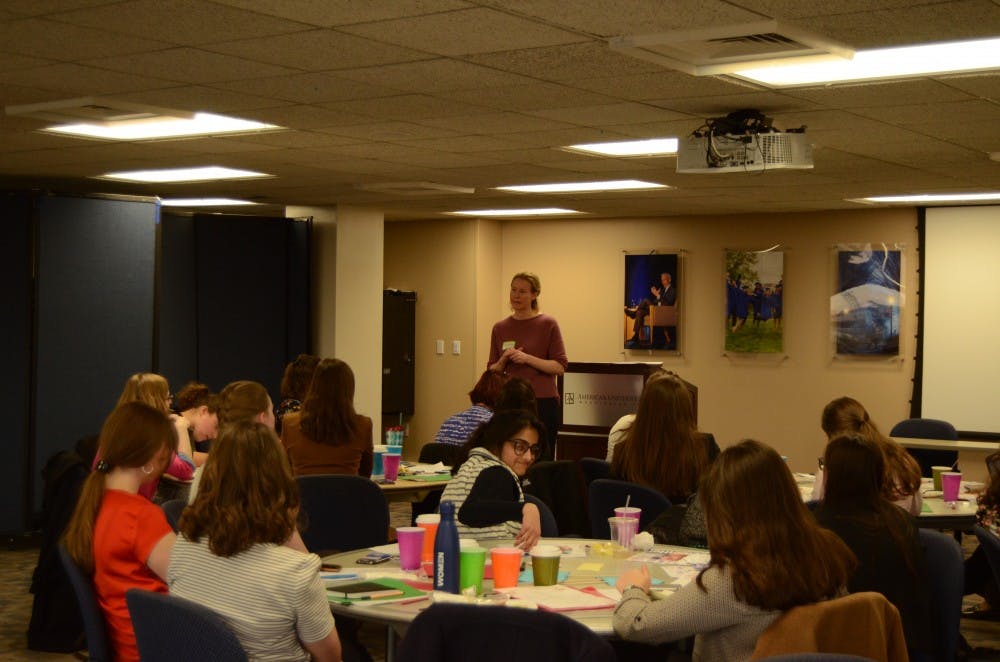The American Association of University Women (AAUW) at AU and Running Start, a nonpartisan organization dedicated to helping young women run for office, held a workshop called “Elect Her” on Feb. 11 as part of a training initiative called Elect Her: Campus Women Win.
The workshop, held in the Butler Boardroom and attended by approximately 50 students, featured speakers and activities to help participants think about what issues are important to them and how to implement these ideas into a campaign.
Elect Her: Campus Women Win is an initiative by Running Start in collaboration with AAUW, launched in 2010. The training focuses specifically on college women and encourages them to run for positions in student government. According to Running Start's website, “Research has shown that women who run for student body elections in college are more likely to run for office as adults.”
The workshop started with speaker Brianne Nadeau, an AU graduate who serves as a D.C. councilmember representing Ward 1. She first ran for office when she was 25 years old, and began her term on the D.C. council on Jan. 2, 2015. She stressed the importance of listening to constituents, and also noted how the D.C. Council was majority female until recently, but now has four women out of 13 councilmembers, down from 6 in 2015.
“I’ve begun the conversation with my male colleagues about how to be more inclusive of women’s voices,” Nadeau said. “It’s so important to be respectful of one another, no matter who it is you’re talking to, no matter whether you agree or disagree. And it’s also something that women inherently understand; that when we’re in groups, when we are working together, when we are listening to one another, we have better outcomes.”
The next speaker was LaRuby May, a former D.C. councilmember who represented Ward 8 from May 2015 to December 2016. Originally from Pensacola, Florida, May came to D.C. to attend graduate school at George Washington University. She spoke about how she was inspired by her parents to serve others.
“Generally speaking, we make an impact once we’ve been impacted,” May said. “We move into action once we’ve been inspired or motivated. Your motivation and inspiration is based on your reality or your perception or your experience.”
May talked about her nonprofit work in southeast D.C. prior to her campaign for the council and how that inspired her to make change, as well as how she had to learn to balance her family with her public life. While initially hesitant to run for office because she wanted to be able to support her mother, May said she ultimately realized she had a duty to the kids she served in her nonprofit work.
Carrie Giddins Pergram, a political communication professor at AU, followed May’s speech. Pergram addressed how to balance campaigning with the media and how to work with reporters and news outlets to promote your message.
“The news has become one of the most effective methods for reaching people. It’s also become one of the most misunderstood ways of reaching people,” Pergram said.“What you need to know is which media is best for disseminating information to the people you want to reach.”
A panel of AU Student Government officials followed Pergram and answered questions about their experiences running for student government. The panel was made up of former SG Undergraduate Senator Valentina Fernandez, former SG President Sasha Gilthorpe and current SG Comptroller Shannon McDermott.
All three women discussed how they were concerned with how they would be perceived when they were campaigning, such as whether or not they looked “put together.” The panel also talked about how running for student government as women impacted their experiences.
“It shouldn’t be me because I’m a woman, it should be me and I’m a woman,” Gilthorpe said.
Workshop participants were then able to brainstorm issues that they may want to focus on in future campaigns. The president of Running Start, Susannah Wellford, led an exercise in creating ‘elevator pitches’ for the issues that had been selected, so participants could briefly pitch their campaign issues. The issues ranged from Trump’s immigration ban to free menstrual products for AU students to diversity and inclusion on campus.
The last speaker of the day was AU professor Liz Suhay, a specialist in public opinion, political psychology and political communication. Suhay discussed political psychology specifically pertaining running for office outside of student government.
“There’s a strange perception out there that there’s something wrong with catering or pandering to public opinion,” Suhay said. “In the U.S. there’s a lot of criticism, ‘Oh, they’re just paying attention to the public opinion,’ taking polls and trying to do exactly what the people want. I look at that and I say, ‘isn’t that what elected representatives are supposed to do?’ From the get-go there’s something wrong with the conversation surrounding public opinion.”
The workshop concluded with participants practicing their elevator speeches and a select few presenting them to the entire group. Wellford spoke of how women running for office can forge change, even if they may doubt themselves or be perceived as power-hungry.
“Women want to run for office so they can get power and give it away,” Wellford said. “You’re promoting yourself as a vehicle to accomplish great things.”





